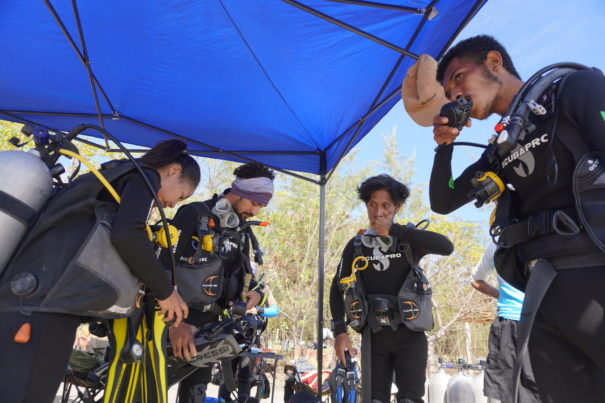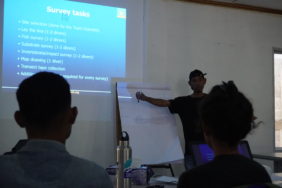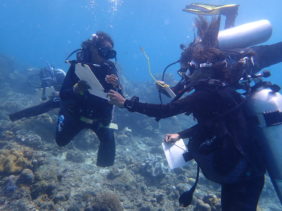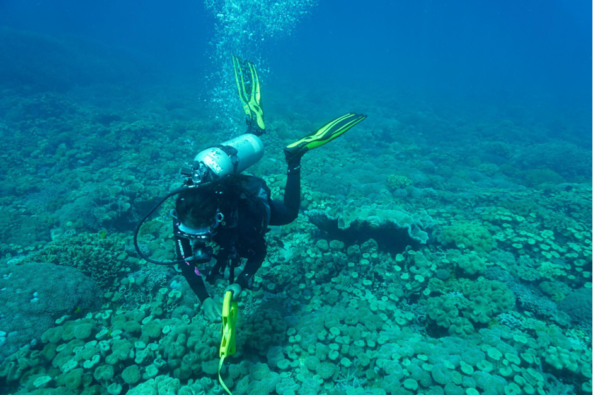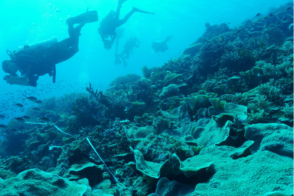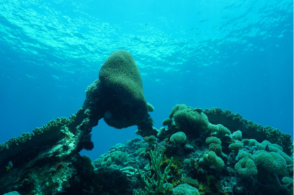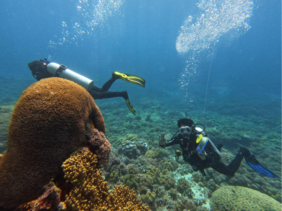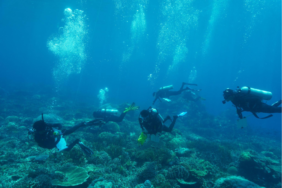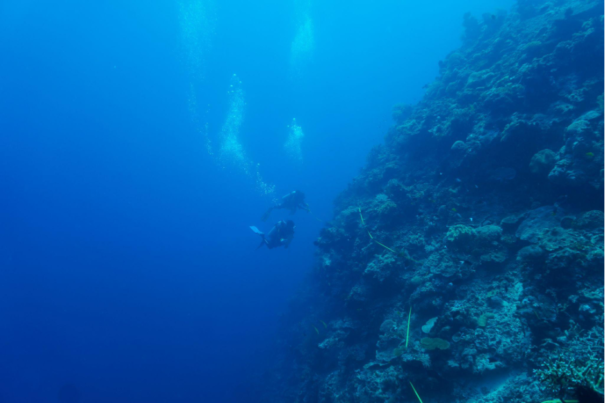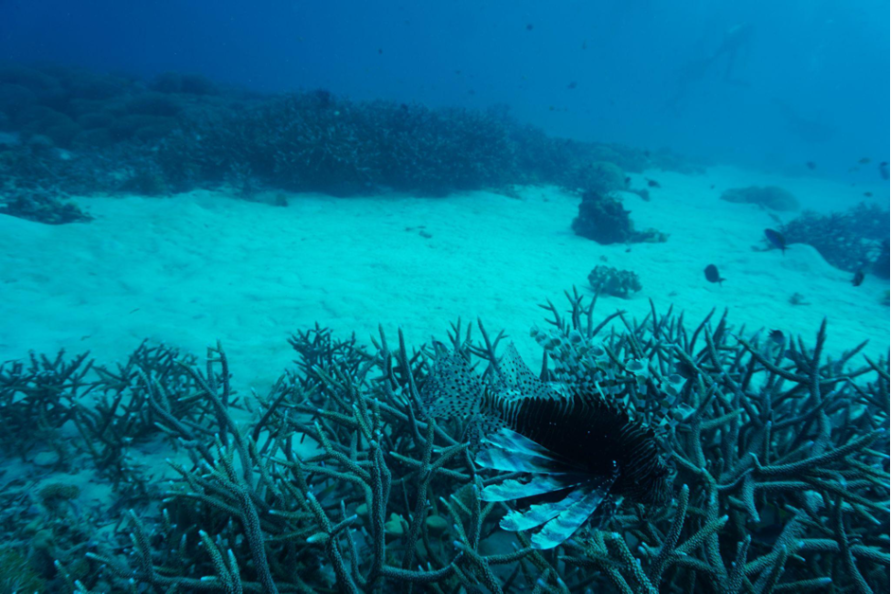Armindo Marques joined Blue Ventures’ Timor-Leste expedition programme in 2017 as a tank and compressor assistant. He quickly became a dive assistant and is now our Conservation Officer. After receiving his SDI Dive Master certification, he led our first reef monitoring programme with Timorese volunteers for our conservation programme. Here he talks about his journey being the first-ever Timorese to train a team of Timorese reef monitoring volunteers.
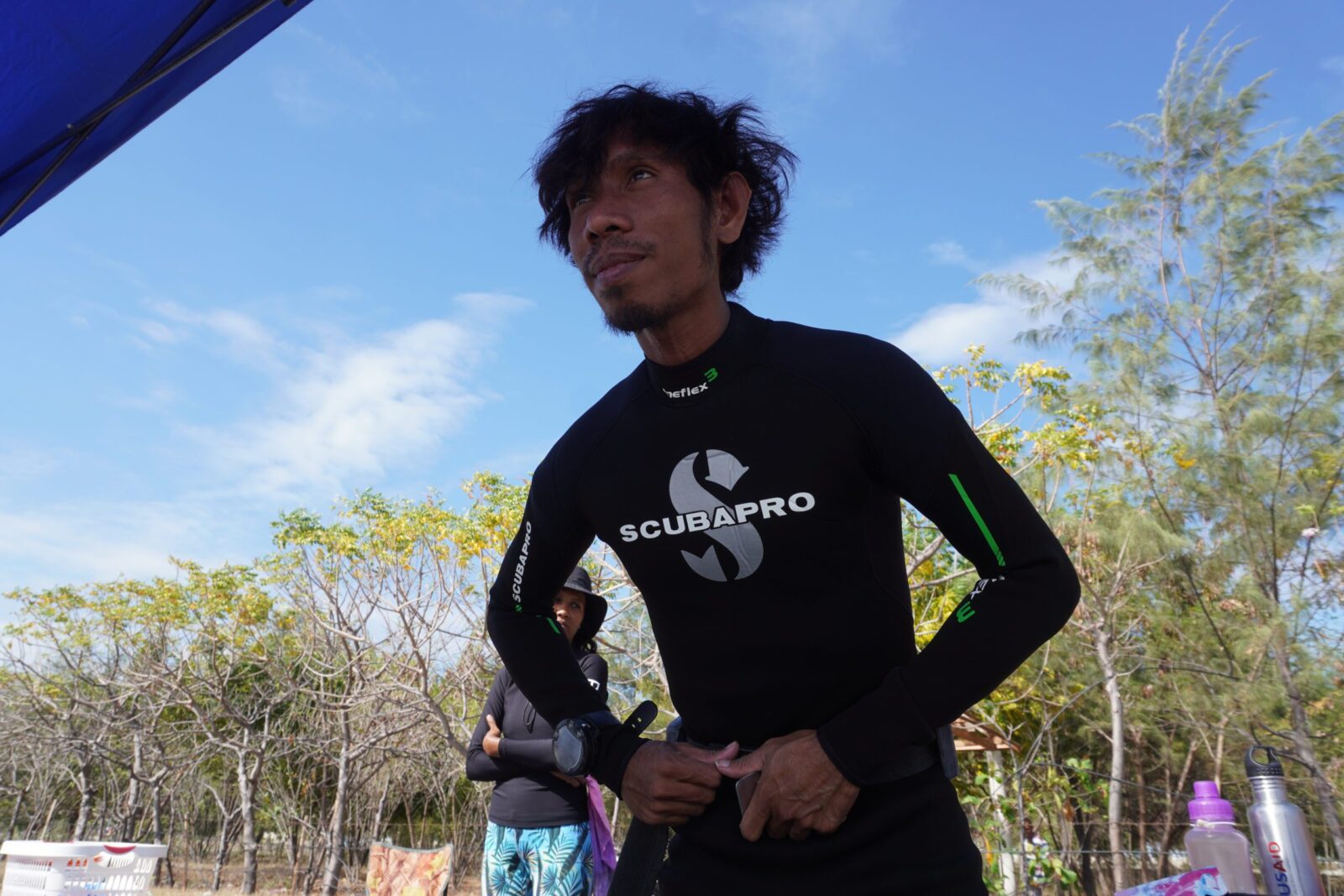
Armindo Marques is Blue Ventures’ Conservation Officer in Timor-Leste.
I come from a long line of fishing families. The ocean is the source of life for us, so I was stunned to realise that we had never monitored our ocean before. When I first joined Blue Ventures, I witnessed people from abroad volunteer just to study the reef’s condition in the ocean that surrounds my home island of Atauro. I thought to myself that this was something unique that I could possibly do one day.
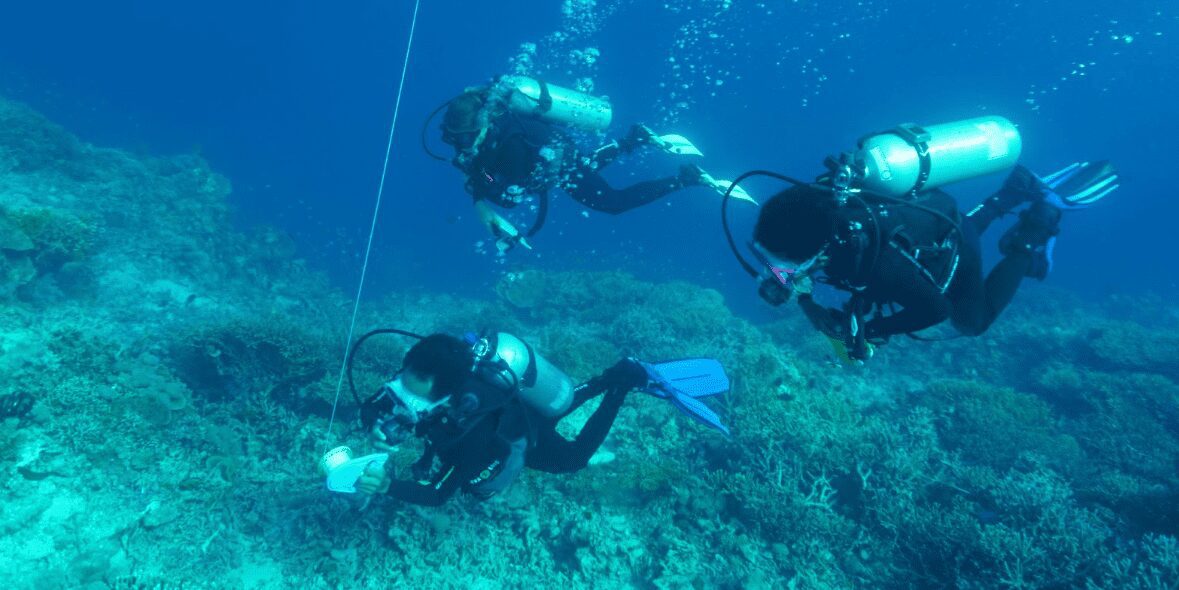
Armindo leading two volunteers underwater, Patricio Ximenes Konservasaun from Flora no Fauna and Birgit Hermann our Timor-Leste Country Director.
Fast forward to 2023, and I am now a conservation officer, certified Dive Master, and trained to do Reef Check, which is a scuba-based reef monitoring programme. This is a role that was just a fleeting thought five years ago. When Blue Ventures changed its focus from expeditions during the pandemic, the opportunity for me to lead reef monitoring activities in Timor-Leste arose, and this time with just Timorese volunteers using the Reef Check methodology. This programme aims to support coastal communities in making informed ocean decisions by collecting data about their marine area and sharing the results with them. To put it simply: fishers and coastal communities want to understand how their livelihoods have impacted marine life and what decisions they should make for the sake of future generations.
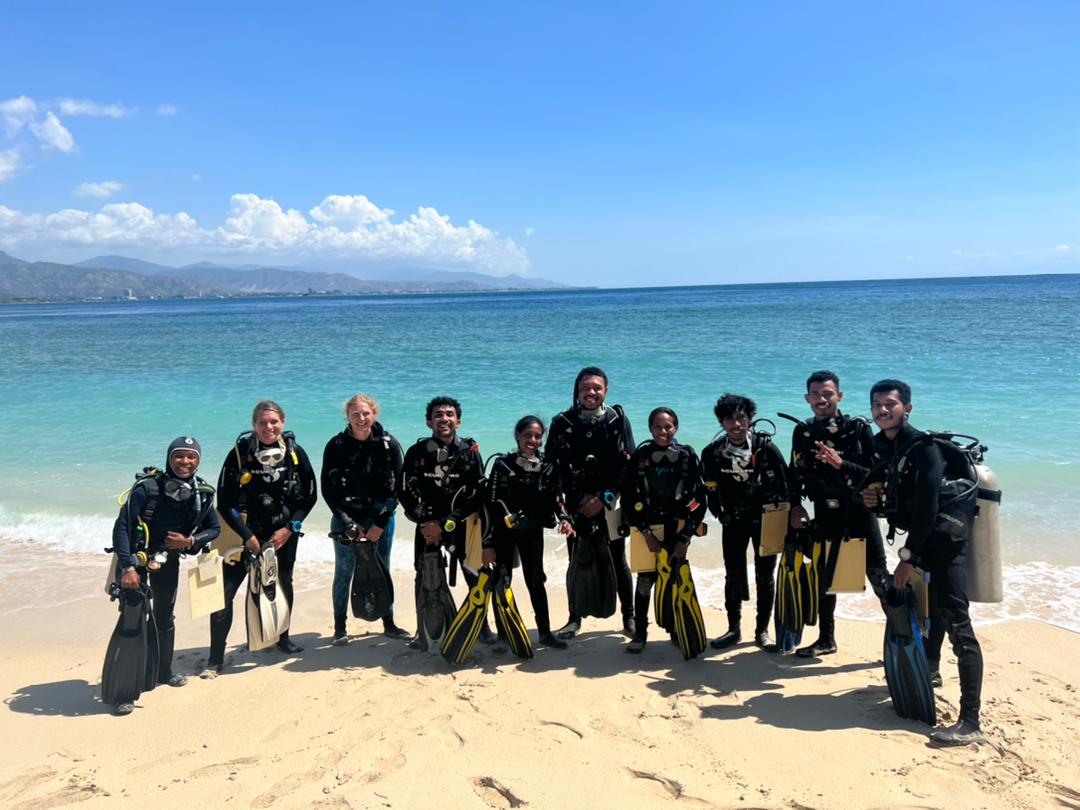
Timorese volunteers and Blue Ventures staff doing Reef Check training with Dreamer’s Dive Academy in safety and emergency response.
The call to apply for Reef Check training and surveying was published in Dili at a time when there were only a few Timorese professional divers. But in the end, Blue Ventures selected six young Timorese trainees that would conduct the country’s first Timorese-led reef monitoring programme.
Reef Check training included in-class lectures and practice sessions underwater.
The volunteers first had to pass theory classes that covered topics such as fish, coral reefs, invertebrates, and impact identification. Then we did water activities to test our buoyancy and in-water skills. This part took more than two months, and then we moved to organising and planning survey activities. This phase taught me the importance of teamwork, discipline and leadership but, at the same time, remembering who we do it for: The people of this community – the guardians of the ocean.
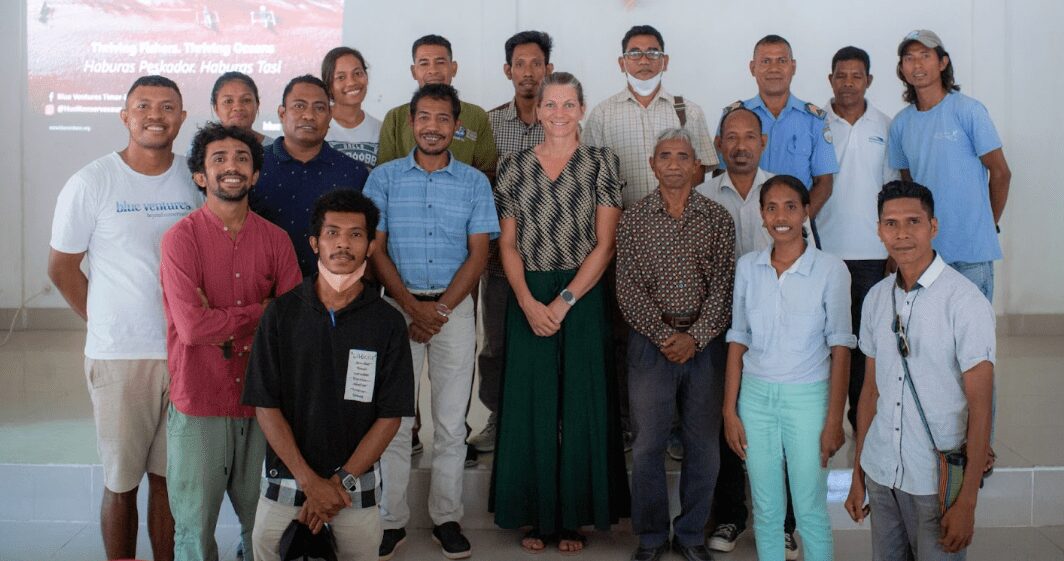
Presenting BV and reef monitoring activities to the local authorities of Atauro, including the sub-district administrator.
When revising the safety procedures and updating the emergency contacts, I realised that I had great support behind me from the BV team. That’s when my confidence became stronger than the nervousness I was trying so hard to hide. We presented the activity plan and our volunteers to the sub-district administrator and other local authorities and were well received. The local priests also held a prayer ceremony for us to ensure spiritual guidance and protection. I felt enormous love and support from my home for BV to safely and successfully complete this programme.
From watching from the outside to now leading these activities with Timorese volunteers, I felt a heart-warming full-circle moment when I piloted the Reef Check survey in my hometown of Beloi in Atauro. The communities in Usu-bemasu village were incredibly supportive and keen to receive the results of our survey, and members of the ‘Tara Bandu’ – a local custom for locally managed marine areas (LMMA) – committee were particularly interested to know the condition of the coral reefs and marine biodiversity. Reef Check is excellent for this because we are able to add more fish and other species to the identification list to fit Timor-Leste’s context.

Surveying one of the Tara Bandu in Beloi, Atauro.
The survey was done in seven locally-managed marine areas in Atauro. I was very happy to see the commitment of the volunteers as they did not lose their enthusiasm and persevered despite the delays caused by the pandemic. More than that, I feel very proud of the volunteers because of their patience in seeking to understand life underwater. Some of them are also pursuing university studies in marine science, and the skills and insights they have acquired will provide a strong foundation of knowledge. More than anything, this is a one-of-a-kind experience in Timor-Leste, especially for marine science students. I know that they are the leaders of the future who can support our coastal communities to live in harmony with the ocean.
We must continue this work for the future. Currently, in Timor-Leste, only BV can provide Reef Check surveys and training. We must continue to inspire the younger generations to see and understand our marine resources and why they are so valuable to protect. There are a lot of young students who are interested in enrolling in reef monitoring training, and this tells me that we are already on the right track.
Find out more about Blue Ventures’ work in Timor-Leste.


